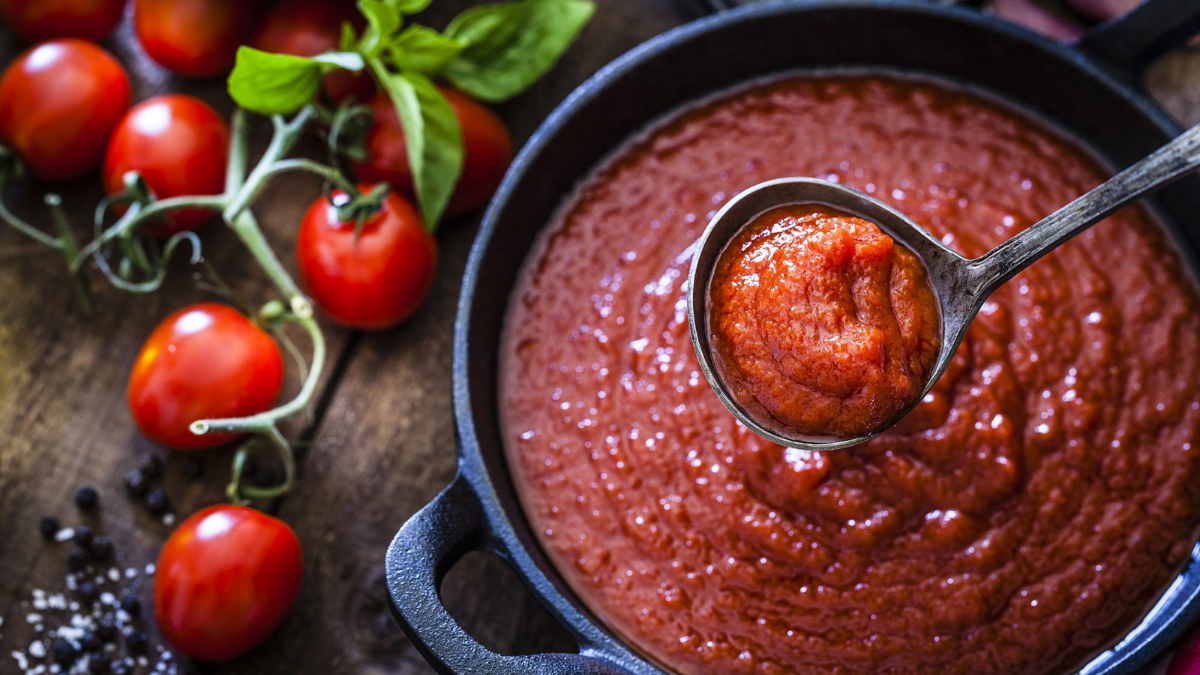Tomato sauce adds flavour to a plate of spaghetti or a piece of pizza, but it also contains essential nutrients. A cup of tomato sauce provides a fourth of your daily vitamin A need and half of your daily vitamin C requirement. Tomatoes are also high in the antioxidant lycopene, found in abundance in nature. Tomato sauce can also provide fibre, depending on how it’s cooked.
Tomato Sauce Nutrition Facts
Tomato Sauce’s Health Benefits
Tomato sauce is lycopene’s most common dietary source, an antioxidant linked to various health benefits, including reduced heart disease and cancer risk. Vitamin C, potassium, folate, and vitamin K are all plentiful in this dish. When completely ripe, tomatoes are usually red, although they can also be yellow, orange, green, or purple. Tomatoes are also divided into subspecies, each with its shape and flavour.
Improve Heart Health
Everyone has a ticker that needs to be taken care of, and tomatoes are one of the most acceptable methods. Some individuals take lycopene pills to protect their hearts, but did you know that tomatoes are a natural source of lycopene? Lycopene, the antioxidant that gives tomatoes their red colour, has been shown to lessen the risk of heart disease.
Free-radical damage and “bad” cholesterol levels are reduced by lycopene, while “good” cholesterol levels are promoted. In ten-year research, people who ate lycopene-rich foods had a 17-26 percent lower risk of heart disease.
Another advantage of ingesting lycopene is that it lowers the risk of some cancers, such as lung and prostate cancer. Studies demonstrate that eating a diet rich in carotenoids (including lycopene) reduces lung and prostate cancer by 32-50 percent.
Improve Digestive Health
Tomatoes are high in water and fibre, with 1.5 grams per tomato. Fibre is a miraculous carbohydrate that the body can’t fully digest, yet it aids in your digestive system’s regular and healthy functioning. Tomato sauce can help with constipation or search for a high fibre diet to decrease cholesterol and maintain blood sugar levels.
A Huge Source of Essential Vitamins
One of the essential health benefits of tomato sauce is its rich source of vitamins C, A, and K, which have several health benefits. Vitamin C aids in the prevention of chronic disease, the management of high blood pressure, the prevention of heart disease, the prevention of iron deficiency, the boost of immunity, and the protection of memory. Vitamin A boosts your immunity while also promoting eye and skin health. Vitamin K is also essential for bone metabolism and blood clotting prevention.
Make Your Bones Stronger
Tomatoes have a lot of calcium and vitamin K in them, and vitamin K is well-known for its role in bone metabolism. When combined with calcium, your bones will be stronger and more resistant to harm. Even better, if minor damage occurs, your bones will be more capable of recovering.
Improve Gut Health
The beneficial effect of tomato sauce on your gut health is one of the most surprising health advantages of tomato sauce. The gut and gut bacteria are two topics that science has recently focused on, mainly how they affect your overall health.
You’ve probably heard of probiotic foods like yogurt or kimchi, which help your gut bacteria grow. Tomatoes, it turns out, have probiotic characteristics, which can help us enhance our good gut bacteria. L. Reuters is one of the most important bacteria, and it helps with your digestive, dental, and overall health. The beneficial properties of L. reuteri are enhanced when served as a sauce, which means the good bacteria in your stomach will have to work harder to keep you healthy.
Loaded with Vitamins and Minerals
Tomatoes are high in natural vitamins and minerals, such as Vitamin A, K, B1, B3, B5, B6, B7, and C, whether eaten whole or as a sauce. Potassium, folate, iron, magnesium, chromium, choline, zinc, and phosphorus are also present. Tomatoes are a natural beauty food because of their high Vitamin C content, promoting healthy skin, while manganese and potassium help your body create more robust bones and reduce muscle cramps. Vitamin A improves vision and protects against macular degeneration and night blindness.
Prevents Cancer
Lycopene, a phytochemical molecule found in tomatoes, is a powerful antioxidant protecting your body’s tissues from free radical damage. Tomatoes can help prevent or lessen cancers of the prostate, cervix, mouth, pharynx, throat, stomach, esophagus, rectal, colon, and ovarian.
Regulates Blood Sugar
Tomatoes are a good source of chromium, which helps to keep blood sugar levels in check.
Promotes Glowing Skin, Stronger Bones, and Healthy Hair
Collagen is a protein produced from Vitamin C and is found in the skin, connective tissues, and nails. Vitamin C deficiency makes skin more susceptible to UV damage, such as wrinkles, sagging skin, and pimples. Tomato sauce is high in Vitamin K, which helps strengthen and regenerate hair strands and strengthen bones. Lycopene increases bone mass, helping battle osteoporosis.
Reduces Chronic Pain
Because tomatoes contain many bioflavonoids and carotenoids, proven anti-inflammatory agents, tomatoes can provide comfort and help avoid pain for millions of individuals who suffer from mild to moderate chronic inflammation (such as back pain, muscle pain, or arthritis).
Can you Eat Tomato Sauce Every Day?
Tomato sauce should be used in moderation. Despite its low-calorie content (about 15 calories per tablespoon), tomato sauce typically contains 160mg of salt per serving, compared to the recommended 920mg per day. Many come with various salts, vinegar, and onion powder to make them even tastier. Long-term consumption of tomato sauce can lead to health issues such as diabetes and obesity. On the other hand, fresh tomato sauce could be a healthy alternative.
This is a dish that may be found in any Indian kitchen. Regularly eating hot sauce or spicy dishes has no substantial drawbacks if it does not cause significant side effects. Back down if you have any adverse effects, such as heartburn, belly pain, diarrhea, or anorectal discomfort.” There isn’t a hard and fast rule about how much hot sauce is too much.
Is it Possible to Lose Weight by Eating Tomato Sauce?
Tomatoes are a high-protein, mineral, dietary fibre, and vitamin source. Tomatoes make your skin smooth, giving it a glossy texture. Apart from these health benefits, tomatoes also have the unexpected benefit of aiding weight loss. One of the essential health benefits of tomato sauce is its rich source of vitamins C, A, and K, which have several health benefits. Tomatoes, high in acidic compounds like malic and citric acid, can induce significant acid reflux in your system if consumed in excess.
The acidic components of the tomatoes cause the release of extra gastric acid in the stomach once the digestive process begins. The Positive. Tomatoes, both canned and fresh, are equally healthful. Both contribute to your daily recommended vegetable intake; according to the CDC, just one out of every ten persons consumes the recommended daily amount of veggies.
Is there a Lot of Sugar in Tomato Sauce?
Unfortunately, the most popular tomato-based products, such as tomato sauce and ketchup, are frequently high in sugar. One teaspoon of sugar is included in 1 tablespoon of ketchup. The average person uses 2 to 4 tablespoons of ketchup, so this can quickly mount up. A single serving of tomato sauce is approximately 15ml (around three teaspoons of tomato sauce) and corresponds to one teaspoon of sugar (glucose and fructose). ” Many sauce manufacturers include fructose corn syrup to enhance the sweetness of the tomatoes, which is not only.
Unhealthy for the gut but can also lead to an increase in. Sugar. Many tinned pasta sauces have sugar added to them, and however, the quantity fluctuates, usually ranging from 2 to 12 grams per 1/2-cup serving. Tomato ketchup or tomato sauce lacks nutritional value because it lacks protein, fiber, vitamins, and minerals. Not to mention the sauce’s high sugar and sodium content. So, except for improving the dish’s flavor, this sauce has no health benefits.
Is Tomato Sauce High in Protein?
Tomato Sauce provides 2.9 grams of protein per cup, about 6% of the required daily consumption. Pasta with tomato sauce is delicious, but it also helps you keep healthy and skinny when appropriately cooked and consumed in the perfect amounts. “This dish has vitamins, fiber, and ‘healthy’ carbohydrates, which provide energy and help the body function properly,” says dietitian Valentina Schir.
Tomato sauce is a nutritious, low-calorie cooking ingredient, but it’s another one where reading the label is crucial,” London adds. Many tomato sauce brands contain added sugar and high sodium content, resulting in extra calories and bloating.
Conclusion
Quality tomato sauce will make the difference, whether you create a basic marinara sauce or complement a stew. To ensure that your canned tomato sauce is healthy, choose the best all-natural tomato sauce prepared from organic tomatoes, herbs, and spices and packaged in BPA-free coated cans. Tomatoes are among the top ten pesticide-laden crops, according to the 2017 EWG Dirty Dozen.
Avoid conventionally cultivated fruit to avoid pesticide residue, which could reduce or eliminate all of tomato sauce’s health advantages. Check the label to be sure you’re getting nutrient-dense tomato sauce. If artificial flavors, high fructose corn syrup, MSG, or artificial food coloring appears on the label, choose a tomato sauce brand that employs only high-quality, ideally organic components.




